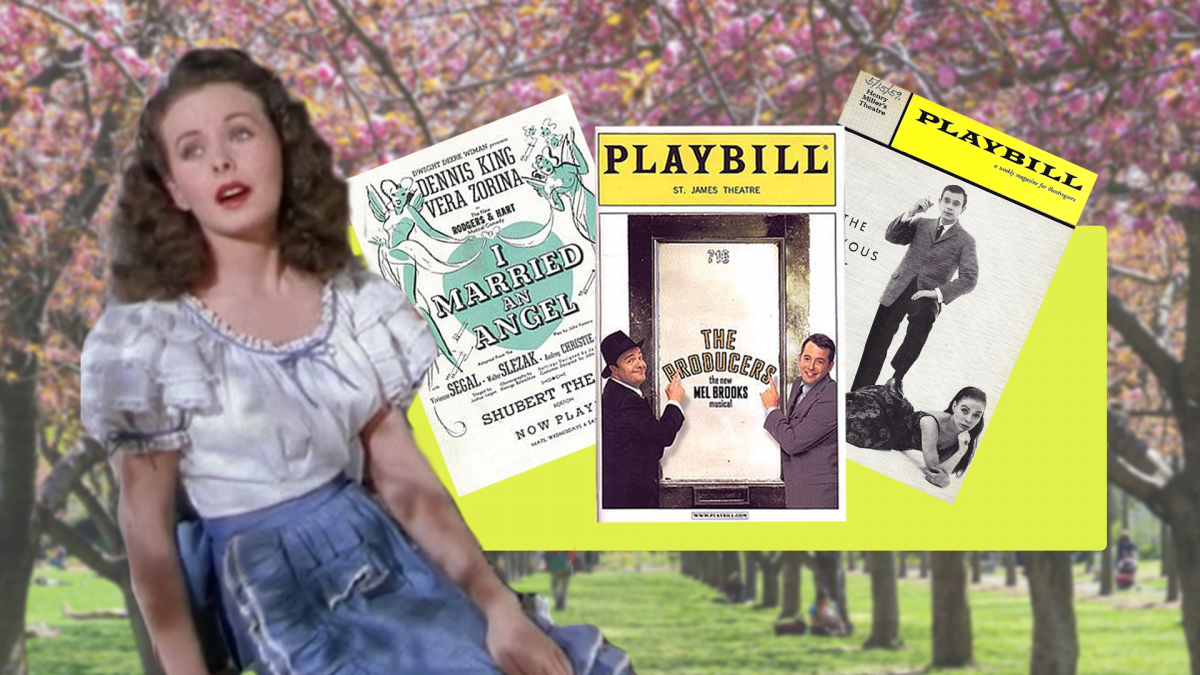By Katie Birenboim
The sun is shining, cherry blossoms are blooming, and many world economies are opening up (slowly but surely). It seems like spring 2021 has finally arrived, bringing with it the seasonal sense of joy, promise, and new beginnings that has long been lauded by writers and artists throughout history. While many people may associate springtime with Shakespeare sonnets, Impressionist paintings, or even madrigals, spring has also been the focus of many Broadway composers and lyricists.
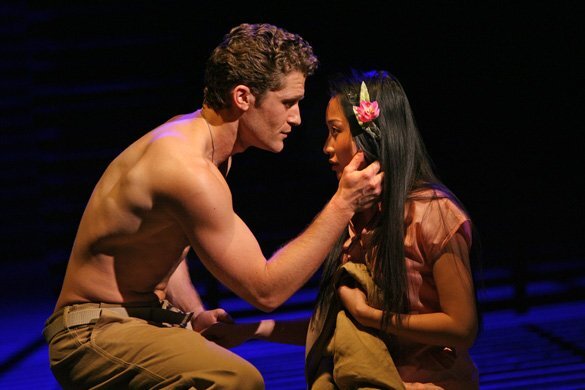
The most obvious example of springtime making its way into the Broadway canon is the song “Younger Than Springtime” from Rodgers and Hammerstein’s South Pacific. Sung right after Lieutenant Cable and Liat first meet (and make love), “Younger Than Springtime” has all the classic markers of a spring love song. Cable compares Liat to spring – favorably – saying she is “younger than springtime,” “gayer than laughter,” “sweeter than music,” and “warmer than the winds of June.” But the song also has a great “turn” – certainly one of the reasons it’s still so well-known today. While Cable begins the song by saying that Liat is like springtime, halfway through, he implies that she is also transformative: “when your youth/and joy invade my arms/and fill my heart as now they do/then younger than springtime/am I.” Through Liat’s love, Cable argues that he becomes someone who is “gayer than laughter,” “softer than starlight,” and “younger than springtime,” too.
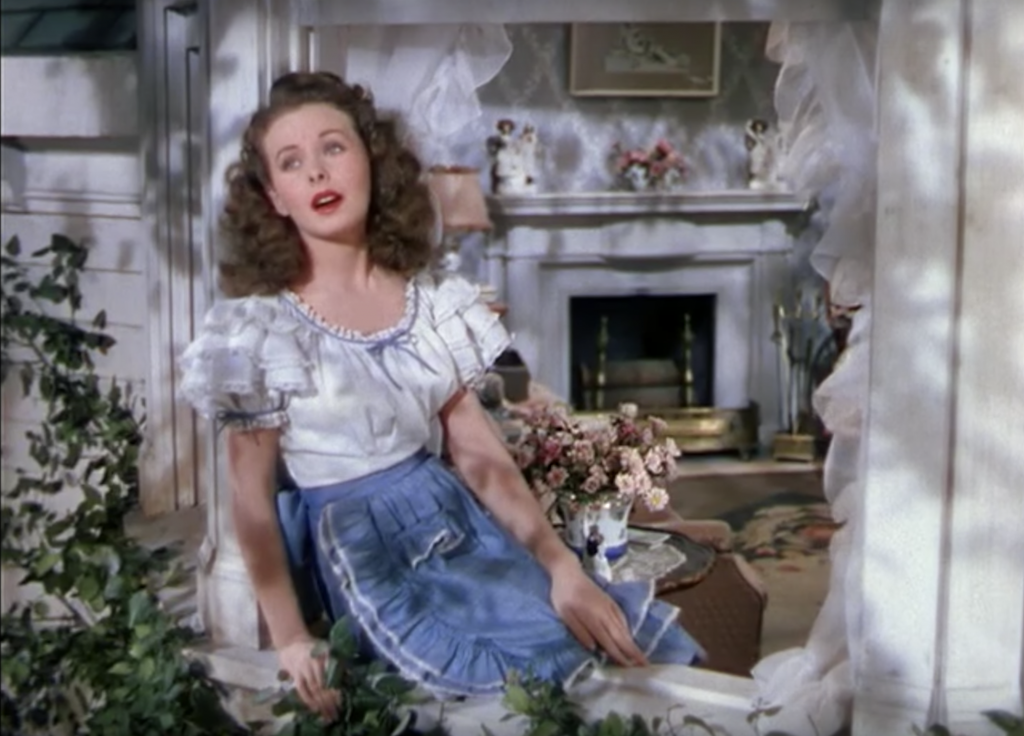
Another well-known use of spring in the lyrics, title, and imagery of a Broadway song can be found in “It Might As Well Be Spring” from State Fair, another Rodgers and Hammerstein collaboration. The song plays with some of the springtime tropes and patterns used in “Younger Than Springtime.” The singer, Margy, makes clear that she hasn’t seen any of the typical, physical signs of oncoming spring. In fact, it’s decidedly not spring: “I haven’t seen a crocus or a rosebud/or a robin on the wing,” Margy sings, “But…it might as well be spring.” This is a prime example of Oscar Hammerstein’s genius use of conditional thinking. In the same way Hammerstein implies in Carousel that Julie Jordan is madly in love with Billy Bigelow using the conditional “IF I loved you,” and that Laurie and Curly in Oklahoma! are similarly destined to mate with the conditional “people will SAY we’re in love,” Hammerstein is able to write a spring love song that’s not actually sung during springtime.
The song grows even more rich and complex in its associations with the season. While the characteristics of springtime that Cable lists in “Younger Than Springtime” are all positive, for Margy “it might as well be spring” not only because she’s “starry-eyed,” “giddy,” and “gay,” but also because she feels “restless,” “jumpy,” and “vaguely discontented.” In “It Might As Well Be Spring” you get both sides of the coin: the good and the bad, the positive and the negative, perhaps best summed up by the lyric: “But I feel so gay/in a melancholy way/that it might as well be spring.” Here, spring is being used as a metaphor for the “nameless” discontent Margy feels with her life at the moment – a vague restlessness which sets up most of the action of the play: while Margy is dating Harry, who wants to marry her, she “keep[s] wishing [she] were somewhere else,/Walking down a strange new street./Hearing words that [she’s]…never heard/ From a man [she’s] yet to meet.” These lyrics foreshadow her meeting, and falling in love with, Pat at the (titular) state fair. It’s also hard not to read these lyrics without picking up something of a sexual edge. When Margy starts the song, she sings of “want[ing] a lot of…things/[she’s] never had before.” Given the traditional associations of birth, new beginnings, love, and even sexuality, with springtime, “It Might As Well Be Spring” could easily speak to Margy’s desires as a newly minted young woman.
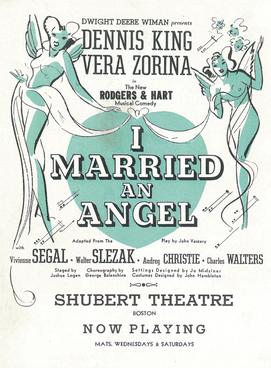
Many Broadway songs focus on this deeper side of spring’s transitions. In Rodgers and Hart’s I Married an Angel, for example, Willy sings “Spring Is Here” when things with his angel-wife (yes, you read that correctly) have gone sour. “Spring is here/why doesn’t my heart go dancing?/spring is here/why isn’t the waltz entrancing?…Maybe it’s because nobody needs me…Maybe it’s because nobody loves me,” he sings. It’s another clever inversion of the springtime myth: spring may be here, with its gentle “breezes,” and “lads and girls…drinking May wine,” but because Willy has fallen out of love, he can no longer enjoy it. It’s a springtime love song that depends on negative space rather than positive space: without “love,” “desire,” or “ambition,” there can be no spring.
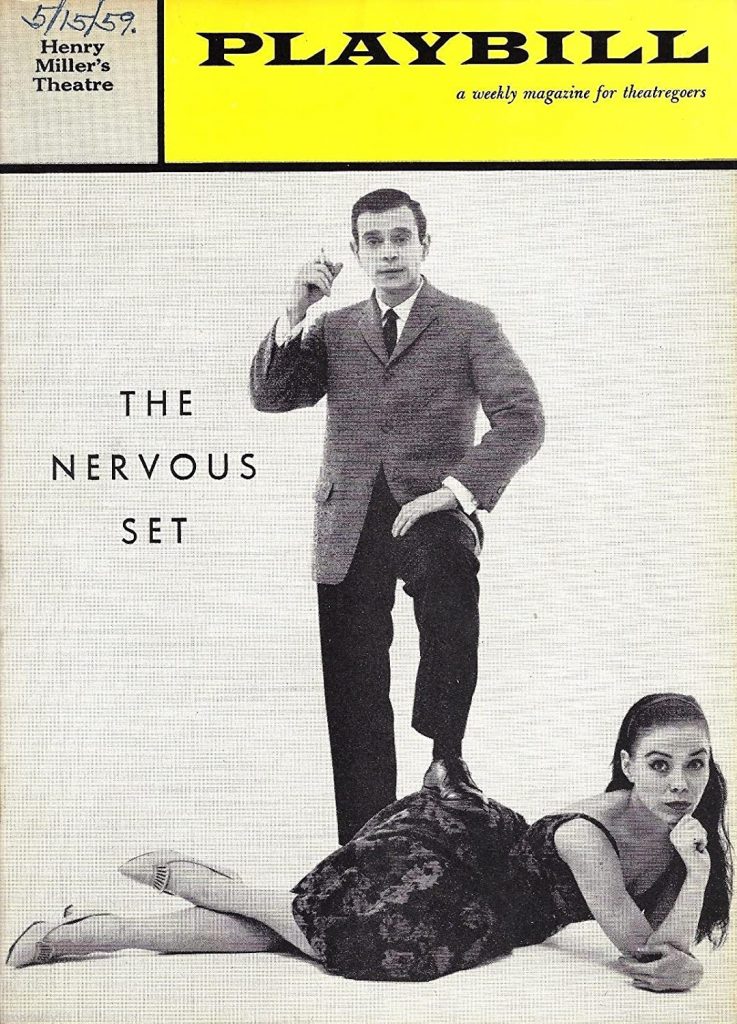
“Spring Can Really Hang You Up the Most,” Fran Landesman and Tommy Wolf’s 1955 tune which was then incorporated into the 1959 musical The Nervous Set, similarly focuses on the “have-nots” of spring rather than the “haves.” A send-up of the first lines of T.S. Eliot’s “The Wasteland” (“April is the cruelest month…”), “Spring Can Really Hang You Up the Most” implies that spring can actually be the worst time of the year – if you’re single, that is. “Spring this year has got me feeling like a horse that never left the post;/I lie in my room staring up at the ceiling/Spring can really hang you up the most!” the lyrics read. The song reverses traditional springtime psychology and implies that the singer was happy and in love in the winter, and now, during the joyful spring season of rebirth, is experiencing loneliness. “Love seemed sure around the New Year,” she sings, “Now it’s April, love is just a ghost;/ Spring arrived on time, only what became of you, dear?” It should be noted that this song, as well as “It Might As Well Be Spring,” became jazz standards, covered by the likes of Ella Fitzgerald and Frank Sinatra. The season’s failure to deliver on its promise is clearly a recurring theme on Broadway and beyond.
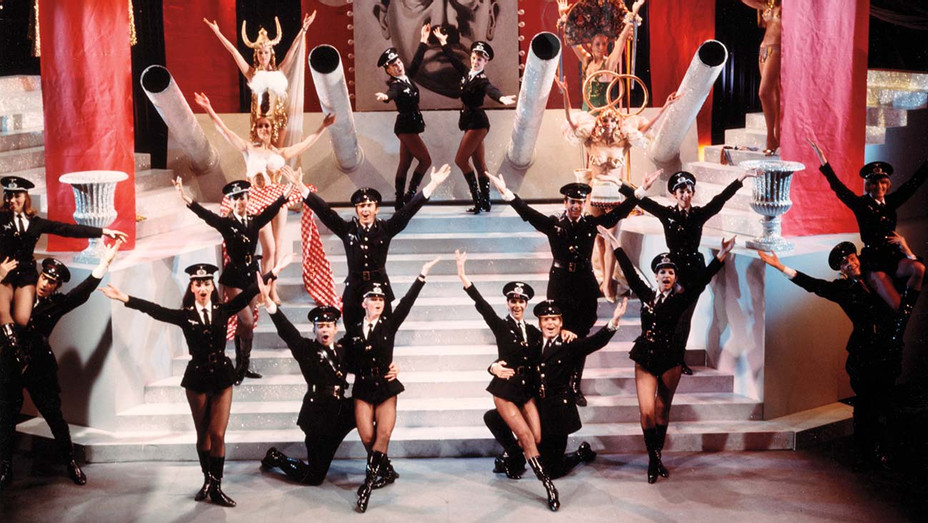
But no discussion of spring on Broadway would be complete without “Springtime for Hitler” from Mel Brooks’ The Producers. The major song in the musical’s show-within-a-show, a favorable retelling of WWII from the perspective of a disgruntled Nazi, “Springtime for Hitler” shows Brooks’ thoughtful understanding – and appreciation – of spring’s metaphorical function in Golden Age musicals. As the tap-dancing, sausage-wearing Nazis sing lines like “And now it’s springtime for Hitler and Germany/Deutschland is happy and gay,” Brooks is sending up the positive traits associated with springtime in musicals like South Pacific and State Fair. And to the Nazis represented in the show, “springtime for Hitler” is indeed positive: it encapsulates their military campaign to take over the world. Brooks makes clear, however, that this seasonal rebirth is actually extremely dark. Peppered in with the image of a “happy and gay” Germany are lyrics about “U-boats…sailing once more.” In the song, springtime equals gaiety, but it also happens to equal “bombs falling from the skies again.” Combined with the schmaltzy musical style, movie-musical tap-dancing, over-the-top costumes, and of course the late, great Gary Beach’s acting, springtime in “Springtime for Hitler,” repeated over 20 times in the eight-minute song, becomes an absurd (and incredibly funny) dramatic irony.
Brooks’ hilarious treatment of springtime is similar to the season’s representation in a lesser known E.Y. Harburg and Fred Saidy song, “Springtime Cometh” from the 1951 flop Flahooley. Like “Springtime for Hitler,” “Springtime Cometh” relies on and leans into the audience’s positive associations with spring and its traditional representation in Golden Age musicals. Sandy/Penny and her genie (truly – don’t ask) sing about “lilacs growing on the clothesline,” “roses growing in the ashcan,” “hummingbird[s],” “merry maidens,” and repeat the word “springtime” six times in the short song. Harburg went one step further and even wrote the lyrics in a sort of faux Olde English: “Springtime cometh,” the characters sing. “Hummingbird hummeth,/little brook rusheth,/merry maiden blusheth…springtime cometh for love of thee.” Harburg pushes this construction even further for comedic effect with “Sugarplum plummeth,/Heart, it humpty-dummeth,/And to summeth up,/The Springtime cometh for the love of thee.” The faux Olde English language reaches its zenith with Harburg’s tongue-and-cheek reference’s to spring’s inherent sexuality: “Lad and lass/In tall green grass/Gaily skippeth,/Nylon rippeth,/Zipper zippeth…which is to say/Spring cometh.” Harburg’s ironic send-up of springtime is sexual, funny, self-aware, and, most importantly, irreverent.
Broadway clearly has a long-time fascination – and infatuation – with all things spring. From the huge number of songs with “spring” in their title (and chorus) – to ones that rely on springtime imagery like the lilac trees in My Fair Lady’s “On the Street Where You Live” – lyricists have used the season to convey and inspire romance, joy, lust, restlessness, loneliness, humor, and personal transformation in equal parts. So in this close-to-post-pandemic moment: crank up the Broadway show tunes, smell the flowers, and look forward to a new (and hopefully, better) day. As they say: “springtime cometh!”
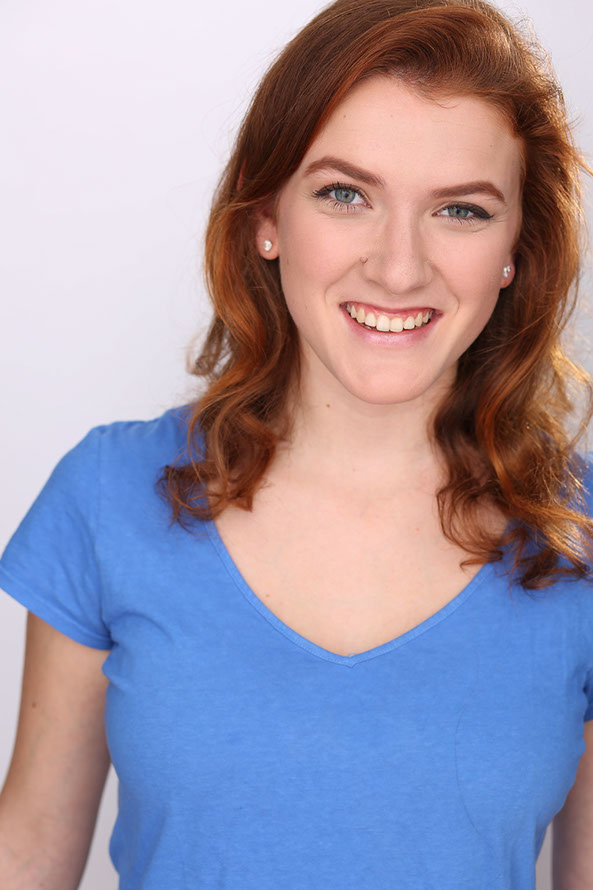
Katie Birenboim is a NYC-based actor, director, and writer. She’s performed and directed at Classic Stage Company, Berkshire Theatre Group, Barrington Stage, City Center Encores!, The Davenport Theatre, and Ancram Opera House, to name a few. She is a proud graduate of Princeton University, member of Actors’ Equity, and hosts a weekly interview show on YouTube with theatre’s best and brightest entitled “Call Time with Katie Birenboim.”
